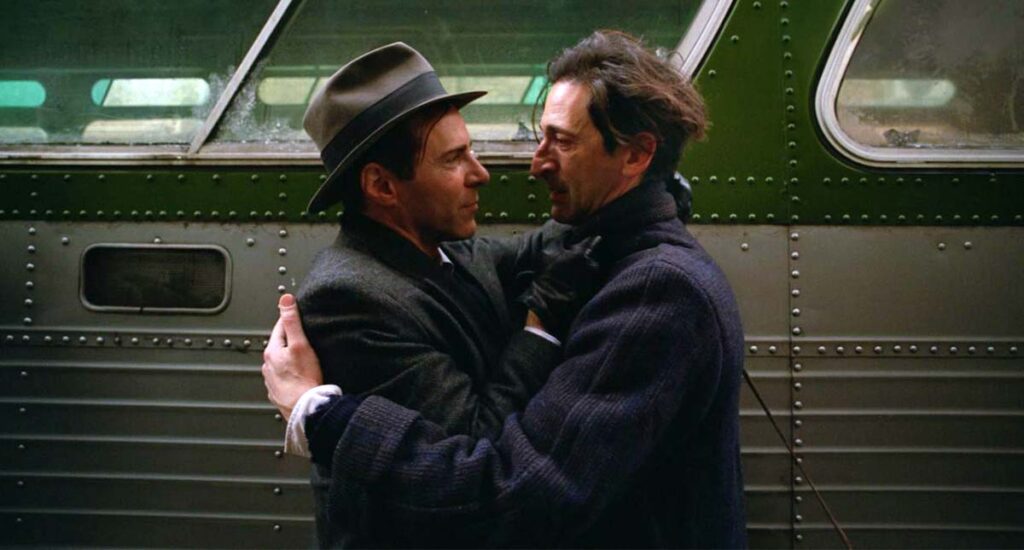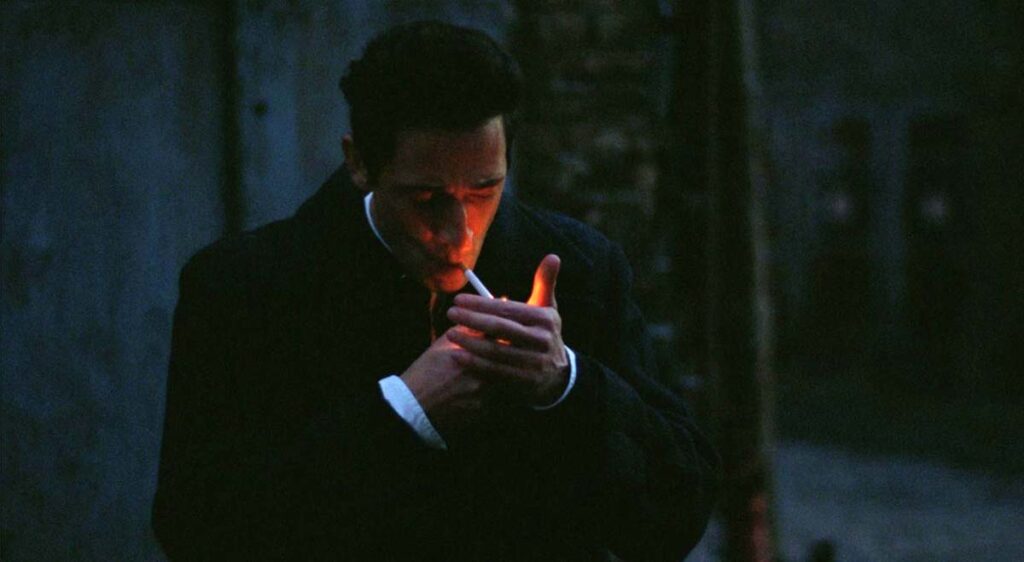Matter and antimatter in contact will annihilate each other, leaving in its place pure energy. Still, millions of years ago, a particle of a billion managed to survive this frantic exchange of uncontained energy—an inconceivably small fraction of matter that would become responsible for creating life on Earth. Brady Corbet’s period epic “The Brutalist” understands that utter and complete annihilation can, almost miraculously, leave in its place not emptiness but a product of such magnitude the simple mind cannot begin to comprehend it.
However, Laszló Toth (Adrien Brody) is not a man of simple mind. A Hungarian Jewish architect trained at the prestigious Bauhaus, Toth escapes war-riddled Budapest to build a new life alongside a distant cousin in Pennsylvania, patiently counting the days until he can bring his beloved wife Erzsébet (Felicity Jones) and niece Zsófia (Raffey Cassidy) to join him in America.
READ MORE: Venice Film Festival Preview: 15 Must-See Movies
As with all good epics, “The Brutalist” sends its protagonist down a road of great fortunes followed by great tragedies, and Harrison Lee Van Buren (Guy Pearce) proves the catalyst for both. The obscenely wealthy entrepreneur surrounds himself with brilliant creatives who are happy to indulge him but cannot mask his artistic ineptitude. He leads a life of excess alongside grown twins Harry (Joe Alwyn) and Maggie (Stacy Martin), the three blissfully obtuse to the fact that true genius often comes from scarcity.
So much of “The Brutalist” is about this excess, from the 300 pounds of film that make up the almost four-hour-long theatrical cut to the scale of the world Corbet creates alongside production designer Judy Becker. This is a world built of concrete and steel but also of sweat and grime, a vision of America that pays attention to human-made structures, both physical and metaphorical. In this, it becomes a maze, unfamiliar and disorienting to a man engulfed by the inescapable awareness of how all that surrounds him is foreign.

To walk into this reality is an overwhelming experience, made even more so by the film’s staggering cinematography. Helmed by Corbet’s longtime collaborator Lol Crawley and shot in luscious 70mmm VistaVision, “The Brutalist” is a work of grandeur, tangibly capturing the softness of early morning daylight simmering through cracks in concrete, the suffocating claustrophobia of ample libraries and ampleness of small cupboards made home, and the desperate nature of movement for those denied the contentment of stillness. Crawley proves wrong the wealthy Van Buren, who believes concrete bears no beauty, his camera finding the gentleness in the austere, playing with perspective and focus to aid the film’s idea that nothing, natural or made, is only ever one thing.
Love The Playlist? Support by signing up for The Playlist Newsletter. All the content you want and, oh, right. It’s free.
Corbet and Mona Fastvold’s story is a refined parable, lending itself to many of the great existential questions surrounding ostracism and violence while breaching issues of sexuality, addiction, and desire. Brody, no stranger to playing men plagued by death and war, seems like the only actor able to play Laszló, a casting choice so inspired as to make it seem obvious. His intricately angled face stands in direct opposition to the stark, bold lines of brutalism, his nose a map of injuries past and sins future, his big hazel eyes infused with permanent melancholy. His embodiment of the dichotomy between nihilism and obsession sustains the film’s central allegory of great legacy borne from self-loathing.
Pierce lands the arguably more challenging job of Van Buren, a character whose penchant for blunt communication makes up for much of the film’s sharp comedy but also a man who is at once victim and executer of treacherous, primal urges. The Australian actor finds in the magnate a chance to thread the lines between the amusing and the unsettling, leaning into flamboyance to deliver some of the film’s most excellent one-liners without ever foregoing the unsteady posturing that signals Van Buren’s ever-present sense of unease. Alas, in all that Pierce succeeds, Alwyn fails, delivering a turn so painfully desperate to achieve a sliver of sincerity it almost threatens to stunt the film’s carefully calculated pacing. But the good thing about a bad supporting turn is that it is often forgettable and, in turn, often forgivable.

The challenge of “The Brutalist” is to solve the puzzle of how such a film was made. A work with such a refined sense of style and place feels like it existed in the world before ever thought of, quietly buried somewhere, just waiting to be found. It is hard to conceive of a director this young and early in his career to be able to deliver a film that comes out of the gates with the confidence and grandeur of a classic. And not a classic in the making, but one already made. [A+]
Follow along with all our coverage of the 2024 Venice Film Festival.
